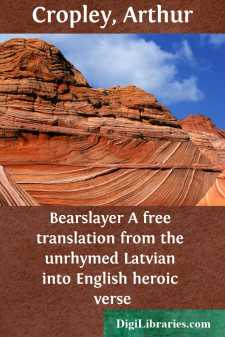Categories
- Antiques & Collectibles 13
- Architecture 36
- Art 48
- Bibles 22
- Biography & Autobiography 813
- Body, Mind & Spirit 142
- Business & Economics 28
- Children's Books 17
- Children's Fiction 14
- Computers 4
- Cooking 94
- Crafts & Hobbies 4
- Drama 346
- Education 46
- Family & Relationships 57
- Fiction 11829
- Games 19
- Gardening 17
- Health & Fitness 34
- History 1377
- House & Home 1
- Humor 147
- Juvenile Fiction 1873
- Juvenile Nonfiction 202
- Language Arts & Disciplines 88
- Law 16
- Literary Collections 686
- Literary Criticism 179
- Mathematics 13
- Medical 41
- Music 40
- Nature 179
- Non-Classifiable 1768
- Performing Arts 7
- Periodicals 1453
- Philosophy 64
- Photography 2
- Poetry 896
- Political Science 203
- Psychology 42
- Reference 154
- Religion 513
- Science 126
- Self-Help 84
- Social Science 81
- Sports & Recreation 34
- Study Aids 3
- Technology & Engineering 59
- Transportation 23
- Travel 463
- True Crime 29
Bearslayer A free translation from the unrhymed Latvian into English heroic verse
by: Arthur Cropley
Categories:
Description:
Excerpt
FOREWORD
Most societies seem to have epic heroes and events that define them as they like to see themselves: Even a young society such as Australia has Ned Kelly, Eureka Stockade, and ANZAC. Others have their Robin Hood, Siegfried, Roland, or Davy Crockett. Lacplesis (Bearslayer) is such a work. Bearslayer is patriotic, brave, strong, tough, loyal, wise, fair, and virtuous, and he loves nature. He embodies the strengths and virtues of the Latvian folk in a legendary age of greatness, before they were subjugated and corrupted by "Strangers".
The poem was important in the growth of Latvian self-awareness As Jazeps Rudzitis, the eminent Latvian folklorist and literary scholar, put it, "There is no other work in Latvian literature whose story has penetrated mass consciousness as deeply or resounded as richly in literature and art as Bearslayer." Thus, it seemed worthwhile to me to make the poem available to people who wish to read it in English, and this volume is the result. It contains the fruits of two years' labour.
In writing Lacplesis Andrejs Pumpurs made an enormous contribution to Latvian literature. Thus, it may seem presumptuous that I have given myself equal prominence with him on the title page. After all, he is the author of the original poem, of which the present text is merely a translation. However, the task of translating a poem is much more than that of taking the words of the source language and replacing them with equivalent words from the target language. In Latvian, in addition to tulkot (to translate), there is a second verb atdzejot, which means approximately "re-versify". As I explain in the Technical Notes (p. iii), I have transformed Pumpurs's original Latvian work into an English poem in heroic verse: The result is an atdzejojums, not "merely" a translation.
The moral support I received from a number of people during the two years I worked on the translation was particularly important to me. I am especially indebted to Edgars Kariks of the Baltic Office of the Association for the Advancement of Baltic Studies, who gave constant encouragement and concrete support, and Ojars Kalnin of the Latvian Institute in Riga, who was extremely positive and supportive from an early stage in the project. These two gave me the courage to keep going. Among others, Rita Berzin read an early fragment and encouraged me to believe I was on the right track, and Jana Felder (née Martinson) responded enthusiastically to a presentation at a conference. Valters Nollendorfs encouraged me to trust my own feeling of what sounded right, and Guntis Smidchens showed interest in the translation from the point of view of a university teacher.
I am greatly indebted to my Latvian teacher in Adelaide, Ilze Ostrovska. Without her I would never have learned enough Latvian to read the original poem. Mirdza Kate Baltais edited the first version of the manuscript and helped me eliminate a very large number of errors, as well as making numerous suggestions for improvements....


